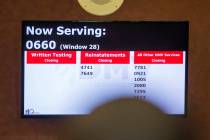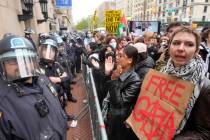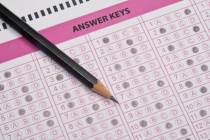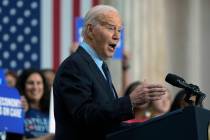Voter photo ID: A different approach to controversial issue
Secretary of State Ross Miller was smart to unveil his voter photo identification legislation last fall, well ahead of the start of the 2013 Legislature. It gave him months to address the concerns of his fellow Democrats, who traditionally loathe voter ID laws.
By the time Mr. Miller’s election modernization plan received a committee hearing last week, some of the reflexive opposition was gone, quite justifiably. Unlike the strict standards of states such as Georgia and Indiana, which require citizens to provide government-issued photo ID at their polling places before they can cast a ballot, Senate Bill 63 puts the burden of producing a photograph and verifying a voter’s identity on the state instead of the individual.
If SB63 becomes law, the paper voter rolls at every precinct would be replaced with laptops that access digital poll books. The records would include the digital Department of Motor Vehicles photos of registered voters. Citizens who are registered to vote but do not have identification or photos on file with the DMV would be required to have their photographs taken by poll workers, then sign an affidavit confirming their identity.
Nevada currently has one of the weakest voter identification standards in the country. People can register to vote and cast a ballot without ever showing photo ID to any elections officer. Voter identity is verified at the polls via signature. That upsets a lot of voters who want to make sure their ballot isn’t cancelled out by a fraudulent one. Mr. Miller’s bill would give poll workers the ability to verify the identities of voters by comparing both their signatures and their photographs.
“There is not a single instance where you would be required to produce a piece of plastic at the polls before you are able to exercise your constitutional right to vote,” Mr. Miller said in support of his bill.
Some individuals and groups remain opposed to SB63 on the grounds that it would disenfranchise the poor and minority voters. It’s hard to see how that could happen if the bill is passed as written.
Mr. Miller’s bill would make voter impersonation exceptionally difficult. But as we wrote in December, he could do more to protect election integrity by using this bill to prevent ineligible voters — especially noncitizens — from registering to vote and casting ballots.
Nevada doesn’t verify the citizenship of registered voters. DMV clerks verify citizenship or immigration status before issuing identification, but don’t record it. If the Legislature required the DMV to record whether driver’s license and state identification card holders are citizens, voter registrars could see the information when they verify names, addresses and photos from the DMV database.
That said, Mr. Miller certainly is on the right track. And we’re glad to see some of his fellow Democrats appear open to a different approach to voter ID. We’re always concerned about increased government costs. But spending between $800,000 and $4 million — mostly on computers — to improve election integrity and voter confidence in the legitimacy of government would be a bargain.

















